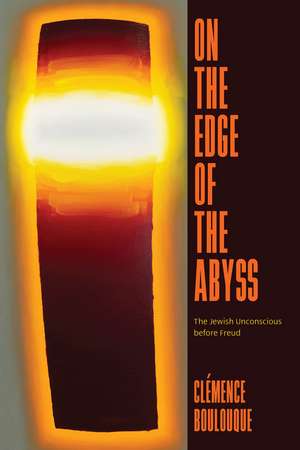On the Edge of the Abyss: The Jewish Unconscious before Freud
Autor Clémence Boulouqueen Limba Engleză Paperback – 19 mar 2025
When Sigmund Freud published his theory of the unconscious, in 1899, he popularized an idea that had fascinated generations of Jewish philosophers before him. In this book, Clémence Boulouque charts the development of the pre-Freudian unconscious from subcultural inquiry to dominant discourse during the long nineteenth century. Although Freud’s scientific notion differed from Schelling’s mythical description of the abyss from which creation springs, its resonance with older ideas was celebrated as an opportunity to express specifically Jewish contributions to modernity. Indeed, Boulouque shows that the pre-Freudian unconscious emerged from conversations in Jewish mysticism about otherness and coexistence. In the hopeful years before World War I, Boulouque argues, such reflections offered the possibility of emancipation not only to Jews but to all.
Preț: 185.66 lei
Nou
Puncte Express: 278
Preț estimativ în valută:
35.53€ • 37.05$ • 29.53£
35.53€ • 37.05$ • 29.53£
Carte nepublicată încă
Doresc să fiu notificat când acest titlu va fi disponibil:
Se trimite...
Preluare comenzi: 021 569.72.76
Specificații
ISBN-13: 9780226838212
ISBN-10: 0226838218
Pagini: 304
Dimensiuni: 152 x 229 mm
Greutate: 0.45 kg
Ediția:First Edition
Editura: University of Chicago Press
Colecția University of Chicago Press
ISBN-10: 0226838218
Pagini: 304
Dimensiuni: 152 x 229 mm
Greutate: 0.45 kg
Ediția:First Edition
Editura: University of Chicago Press
Colecția University of Chicago Press
Notă biografică
Clémence Boulouque is the Carl and Bernice Associate Professor of Jewish and Israel Studies at Columbia University. She is the author of many books, including Another Modernity: Elia Benamozegh’s Jewish Universalism.
Cuprins
Introduction
Part I: Beyond Reason: The Unconscious as a Bond for Humanity
1. The Kabbalistic Genesis of the Unconscious: Schelling’s Legacy
2. Schelling’s Jewish Receptions: Kabbalah and/as the Unconscious
3. The Margins of Reason: The Wissenschaft des Judentums, Kabbalah Studies, and the Emerging Science of the Mind
4. Emerson’s Oversoul, “American Religion,” and Kabbalistic Motives
Part II: The Mind as Battleground: The Collective Psyche in Jewish Thought and the Many Claims to the Unconscious
5. Jewish Spirit, National Spirit, and Absolute Spirit: Building Blocks of the Collective Unconscious and the Defense of Judaism
6. Völkerpsychologie: A Psychology of Culture against a Race-Based Spirit
7. The Unconscious as Mystique? Hartmann’s Philosophy of the Unconscious and Its Jewish Critics
8. The “Retrospective Unconscious”: Reading the Jewish Tradition as Psychology
Coda
Acknowledgments
Notes
Bibliography
Index
Part I: Beyond Reason: The Unconscious as a Bond for Humanity
1. The Kabbalistic Genesis of the Unconscious: Schelling’s Legacy
2. Schelling’s Jewish Receptions: Kabbalah and/as the Unconscious
3. The Margins of Reason: The Wissenschaft des Judentums, Kabbalah Studies, and the Emerging Science of the Mind
4. Emerson’s Oversoul, “American Religion,” and Kabbalistic Motives
Part II: The Mind as Battleground: The Collective Psyche in Jewish Thought and the Many Claims to the Unconscious
5. Jewish Spirit, National Spirit, and Absolute Spirit: Building Blocks of the Collective Unconscious and the Defense of Judaism
6. Völkerpsychologie: A Psychology of Culture against a Race-Based Spirit
7. The Unconscious as Mystique? Hartmann’s Philosophy of the Unconscious and Its Jewish Critics
8. The “Retrospective Unconscious”: Reading the Jewish Tradition as Psychology
Coda
Acknowledgments
Notes
Bibliography
Index
Recenzii
“Boulouque demonstrates the emergence of the idea of the unconscious out of complex inter-cultural dialectics, including between Lurianic Kabbalah and German Idealism, religious and secular thinkers, Emersonian Transcendentalism and American Jewish innovators, German Jewish émigrés and contemporary rabbis. She explores this story’s implications for ethnic and national identity as well as for power relationships between majorities and minorities. This work is a major contribution to central issues across the humanities today.”
“Is there anything new to say about the unconscious? This remarkable book’s answer is affirmative. With subtle intelligence and vast erudition, Boulouque exposes the kabbalistic roots of the unconscious, and argues that the pre-Freudian unconscious is a better guide than the Freudian in the exploration of otherness.”
“In On the Edge of the Abyss, Boulouque drills deep into modern Jewish thought to excavate a variety of fascinating and suggestive renderings of the unconscious before Freud. She takes the reader on a circuitous journey across a wide swath of sources, quilting together many cases where the unconscious emerged from the depths of Jewish thinking. On this subject, nothing has been done before. Highly recommended.”
